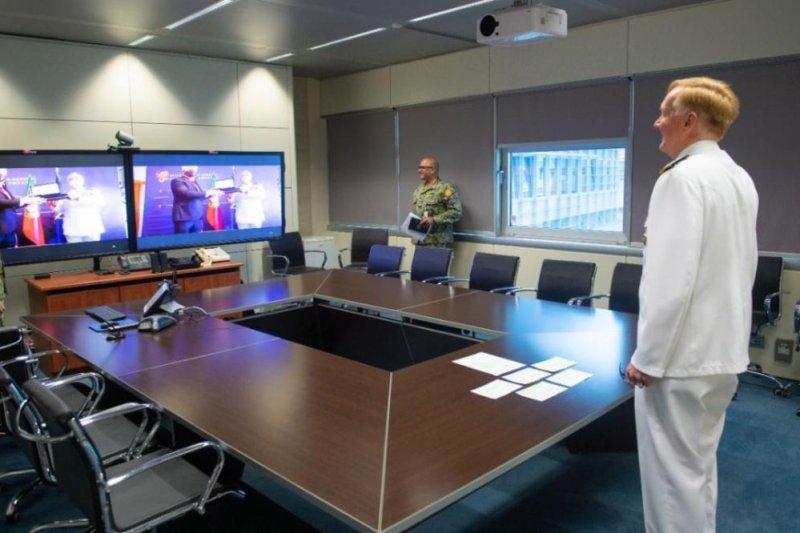1 of 2 | In a virtual ceremony Wednesday -- ahead of the change of command at Allied Joint Force Command Naples, Italy, on Friday -- outgoing commander Adm. James Foggo III, R. received the St. George medal from the Portuguese Armed Forces. Photo courtesy of JFC Naples
July 17 (UPI) -- NATO needs a new naval strategy to counter Russia and China, the outgoing chief of U.S. Naval Forces Europe-Africa said on Friday as he relinquished command.
In a change of command ceremony in Naples, Italy, Adm. James G. Foggo handed authority to Adm. Robert P. Burke, who now commands Joint Force Command Naples, as well as U.S. Naval Forces Europe and U.S. Naval Forces Africa, the Navy said.
Foggo noted, in an interview prior to the ceremony, that global naval security has changed in the nine years since NATO formalized a sea strategy, which he said currently takes no account of "the return, or the resurgence, of the Russian submarine force."
"It misses the rise of China as a great power, it misses completely the illegal annexation of Ukraine [in 2014]," Foggo said. "That's not a criticism of NATO. That's just something that, you know, I'm making my colleagues aware of. I think we need to do a refresh."
During the ceremony, held outdoors in the courtyard of JFC Naples headquarters with observed social distancing protocols and a reduced number of guests, Foggo's 39-year career, and nine years leading the Joint Forces, was praised.
"An incredible leader," said Secretary of the Navy Kenneth Braithwaite. "I've watched Adm. Foggo -- over his 39 years -- lead from the front, taking care of his sailors. He is an incredible mentor. He set the example for what it was to be a United States naval officer."
Foggo is scheduled to retire during the summer.
"You've served with great distinction for the last three years in command, just as you have throughout your outstanding career," said Gen. Tod Wolters, NATO Supreme Allied Commander.
"Under your leadership, JFC Naples and NAVEUR [U.S. Naval Forces Europe] have taken readiness, deterrence, and defense to new heights," Wolters said. "From bringing carrier operations back above the Arctic Circle, to Trident Juncture, the largest NATO exercise since the end of the Cold War, and with ever vigilant theater anti-submarine activity, you and the men and women of this command have made entries into the history books to be highlighted for generations."
Ahead of the ceremony, Foggo also on Wednesday received the St. George Cross medal, a military honor from the Portuguese Armed Forces, in a virtual presentation.
"Our theater is the most kinetic in the world," Foggo said during the change of command.
"We face four of the five challenges listed in the U.S. National Defense Strategy -- China, Russia, Iran, and violent extremist organizations," Foggo said. "We must be ready for an era of increasing geostrategic competition. It will be vital for us to reaffirm our commitment to Allies and partners. NATO is the bedrock of European and transatlantic security."
Burke, now with two commands, is expected to be a formidable voice if NATO follows Foggo's suggestion to revamp its naval strategy.
"Maritime forces are going to be key in this era of great power Competition," said Burke in a statement on Friday.
"They can be at the right place at the right time for the right purpose, whether providing assistance, training and exercising with allies and partners, or dissuading an adversary from making a grave miscalculation on any given day," Burke said.















